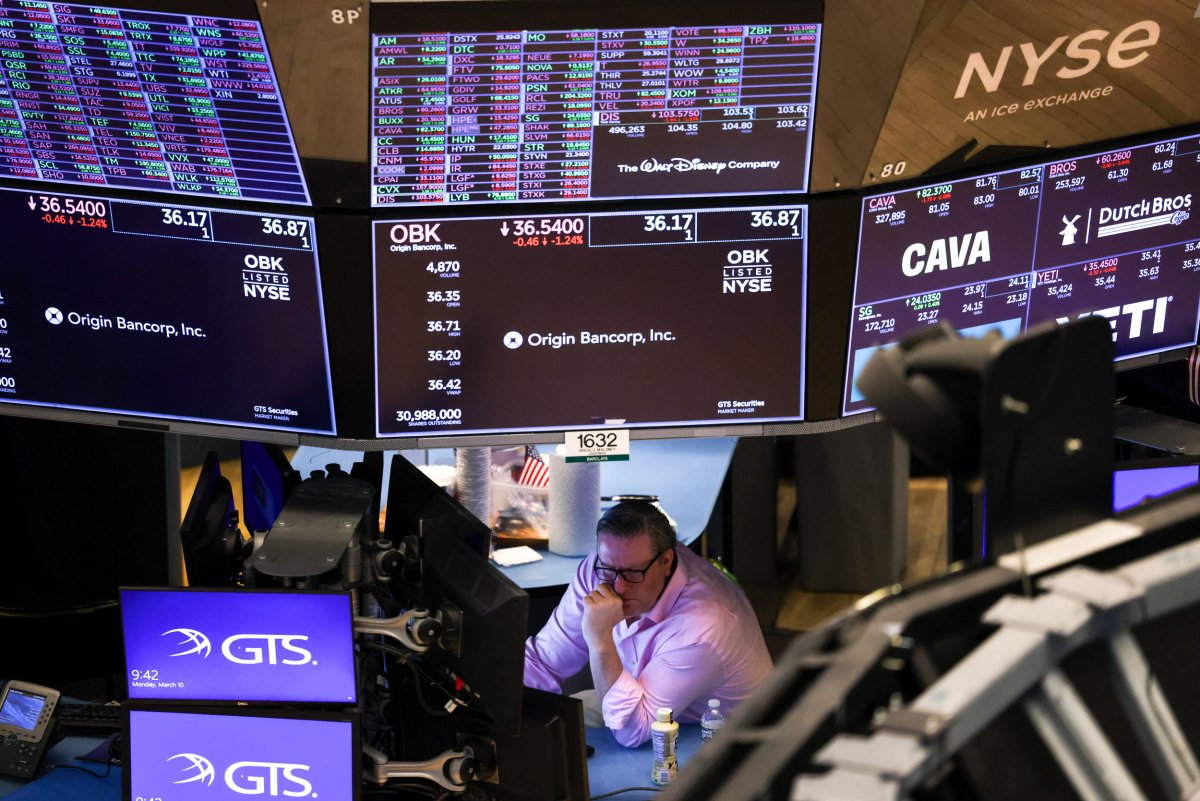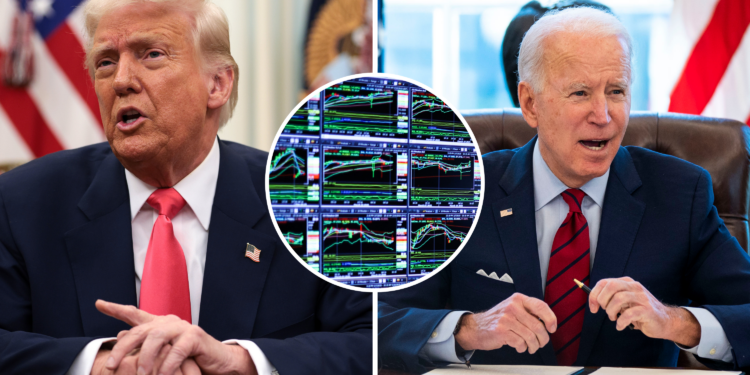American stocks have experienced a dizzying ride since Donald Trump made his return to the Oval Office, but how does market volatility compare with President Joe Biden‘s first days in office?
Markets witnessed a U.S. bloodbath on Monday, the Dow and S&P registering heavy losses, and the Nasdaq shedding 4 percent for its worst daily result since September 2022.
Why It Matters
While still in the early days of his second administration—a fact that has allowed the president to blame the economic difficulties on his predecessor—significant market declines have greeted Trump’s actions and statements in the past few weeks.
Losses witnessed across major indexes have been attributed to tariff-related uncertainty, as well as other indicators of the overall health of the U.S. economy.

Alex Wong / Charly Triballeau / Doug Mills/Getty Images / AFP via Getty Images
As well as prompting fears over a recession in the near future, the market turbulence could significantly impact the popularity of the incumbent president, whose path to the White House was paved with promises of prosperity for businesses and American households alike.
How Did the U.S. Stock Market Perform in Each President’s First 50 Days?
To get a picture of how the stock market performed in the early days of each presidency, Newsweek examined how much was gained—or lost—across the three most watched indexes, comparing closing levels on the days before their inauguration (January 19, 2021 for Biden and January 17, 2025 for Trump) to March 11 of that year.
Dow Jones Industrial Average
The DJIA, composed of 30 blue chip stocks across various industries, saw healthy gains in Biden’s first 50 days.
The index climbed from 30,930.52 to 32,297.02 between January 19 and March 11, a 4.4 percent return.
Under Trump, meanwhile, the Dow has dropped 3.6 percent, falling from 43,487.83 the day before his inauguration to close at 41,911.71 on Monday.
S&P 500
The Standard & Poor’s 500 tracks the performance of the 500 largest, publicly traded companies in the U.S., and is widely regarded as a strong indicator of the overall health of the American market.
In the 50 days following Biden’s inauguration, the index rose 2.6 percent from 3,798.91 to 3,898.81.
While it saw modest increases until mid-February, the S&P 500 has fallen 6.4 percent since Trump took office, dropped from 5,996.66 to 5,614.56.
Nasdaq composite
The Nasdaq composite includes more than 3,000 companies—virtually all stocks listed on the Nasdaq exchange—and is regarded as a crucial indicator of the performance of the tech sector and internet-based businesses.
Under Biden, the index dipped from 13,197.18 to 13,068.83, just under a one percent decline.
The Nasdaq has been the worst performing index under Trump, falling 11 percent from 19630.20 to 17468.32.
Is Trump to Blame?
A direct comparison of each president’s stock market performance is marred by the fact that both inherited unique and significant economic difficulties early in their presidency.
Biden came to power when the country was still reeling with the lingering effects of the COVID pandemic, including elevated unemployment.

Charly Triballeau/AFP via Getty Images
Trump’s early stock market performance has also been hampered by a few outside factors aside from his policies, which have taken a particular toll on the tech-heavy Nasdaq. A notable example was the introduction of the DeepSeek AI chatbot in late January, which sparked concerns about America’s future leadership in the emerging industry and its overall tech dominance, and prompted one of the biggest sell-offs in the index’s history.
However, the Nasdaq swiftly recovered most of these losses, and the declines seen in the past month have largely been attributed to Trump’s on-again, off-again tariff plans. Meanwhile, Monday’s decline—which eclipsed the late-January sell-off—was linked to his remarks about a potential recession in America’s near future.
What People Are Saying
On Sunday, President Trump told Fox News‘ Maria Bartiromo that the U.S. economy was in a “period of transition,” and refused to rule out the possibility of a recession. “I hate to predict things like that,” he said. “There is a period of transition, because what we’re doing is very big. We’re bringing wealth back to America. That’s a big thing. And there are always periods of—it takes a little time. It takes a little time. But I don’t—Ithink it should be great for us. I mean, I think it should be great.”
Kenneth Rogoff, professor of Economics at Harvard University and former Chief Economist at the International Monetary Fund (IMF), previously told Newsweek: “The thing that probably has the markets most spooked is the sharp decline in consumer confidence.”
During last week’s Bloomberg Invest conference, Cathie Wood, CEO of global asset management firm Ark Invest, said that Trump would usher in a business boom similar to the “golden age” experienced under Ronald Reagan.
As trading closed on Monday, a White House official told reporters: “We’re seeing a strong divergence between animal spirits of the stock market and what we’re actually seeing unfold from businesses and business leaders, and the latter is obviously more meaningful than the former on what’s in store for the economy in the medium to long term.”
What Happens Next?
Economists and White House officials are currently split regarding the chances of a recession—Commerce Secretary Howard Lutnick telling NBC on Sunday that Americans should “absolutely not” prepare for this to happen, and that the president will “win for the American people.”
American stocks have experienced a dizzying ride since Donald Trump made his return to the Oval Office, but how does market volatility compare with President Joe Biden‘s first days in office?
Markets witnessed a U.S. bloodbath on Monday, the Dow and S&P registering heavy losses, and the Nasdaq shedding 4 percent for its worst daily result since September 2022.
Why It Matters
While still in the early days of his second administration—a fact that has allowed the president to blame the economic difficulties on his predecessor—significant market declines have greeted Trump’s actions and statements in the past few weeks.
Losses witnessed across major indexes have been attributed to tariff-related uncertainty, as well as other indicators of the overall health of the U.S. economy.

Alex Wong / Charly Triballeau / Doug Mills/Getty Images / AFP via Getty Images
As well as prompting fears over a recession in the near future, the market turbulence could significantly impact the popularity of the incumbent president, whose path to the White House was paved with promises of prosperity for businesses and American households alike.
How Did the U.S. Stock Market Perform in Each President’s First 50 Days?
To get a picture of how the stock market performed in the early days of each presidency, Newsweek examined how much was gained—or lost—across the three most watched indexes, comparing closing levels on the days before their inauguration (January 19, 2021 for Biden and January 17, 2025 for Trump) to March 11 of that year.
Dow Jones Industrial Average
The DJIA, composed of 30 blue chip stocks across various industries, saw healthy gains in Biden’s first 50 days.
The index climbed from 30,930.52 to 32,297.02 between January 19 and March 11, a 4.4 percent return.
Under Trump, meanwhile, the Dow has dropped 3.6 percent, falling from 43,487.83 the day before his inauguration to close at 41,911.71 on Monday.
S&P 500
The Standard & Poor’s 500 tracks the performance of the 500 largest, publicly traded companies in the U.S., and is widely regarded as a strong indicator of the overall health of the American market.
In the 50 days following Biden’s inauguration, the index rose 2.6 percent from 3,798.91 to 3,898.81.
While it saw modest increases until mid-February, the S&P 500 has fallen 6.4 percent since Trump took office, dropped from 5,996.66 to 5,614.56.
Nasdaq composite
The Nasdaq composite includes more than 3,000 companies—virtually all stocks listed on the Nasdaq exchange—and is regarded as a crucial indicator of the performance of the tech sector and internet-based businesses.
Under Biden, the index dipped from 13,197.18 to 13,068.83, just under a one percent decline.
The Nasdaq has been the worst performing index under Trump, falling 11 percent from 19630.20 to 17468.32.
Is Trump to Blame?
A direct comparison of each president’s stock market performance is marred by the fact that both inherited unique and significant economic difficulties early in their presidency.
Biden came to power when the country was still reeling with the lingering effects of the COVID pandemic, including elevated unemployment.

Charly Triballeau/AFP via Getty Images
Trump’s early stock market performance has also been hampered by a few outside factors aside from his policies, which have taken a particular toll on the tech-heavy Nasdaq. A notable example was the introduction of the DeepSeek AI chatbot in late January, which sparked concerns about America’s future leadership in the emerging industry and its overall tech dominance, and prompted one of the biggest sell-offs in the index’s history.
However, the Nasdaq swiftly recovered most of these losses, and the declines seen in the past month have largely been attributed to Trump’s on-again, off-again tariff plans. Meanwhile, Monday’s decline—which eclipsed the late-January sell-off—was linked to his remarks about a potential recession in America’s near future.
What People Are Saying
On Sunday, President Trump told Fox News‘ Maria Bartiromo that the U.S. economy was in a “period of transition,” and refused to rule out the possibility of a recession. “I hate to predict things like that,” he said. “There is a period of transition, because what we’re doing is very big. We’re bringing wealth back to America. That’s a big thing. And there are always periods of—it takes a little time. It takes a little time. But I don’t—Ithink it should be great for us. I mean, I think it should be great.”
Kenneth Rogoff, professor of Economics at Harvard University and former Chief Economist at the International Monetary Fund (IMF), previously told Newsweek: “The thing that probably has the markets most spooked is the sharp decline in consumer confidence.”
During last week’s Bloomberg Invest conference, Cathie Wood, CEO of global asset management firm Ark Invest, said that Trump would usher in a business boom similar to the “golden age” experienced under Ronald Reagan.
As trading closed on Monday, a White House official told reporters: “We’re seeing a strong divergence between animal spirits of the stock market and what we’re actually seeing unfold from businesses and business leaders, and the latter is obviously more meaningful than the former on what’s in store for the economy in the medium to long term.”
What Happens Next?
Economists and White House officials are currently split regarding the chances of a recession—Commerce Secretary Howard Lutnick telling NBC on Sunday that Americans should “absolutely not” prepare for this to happen, and that the president will “win for the American people.”















